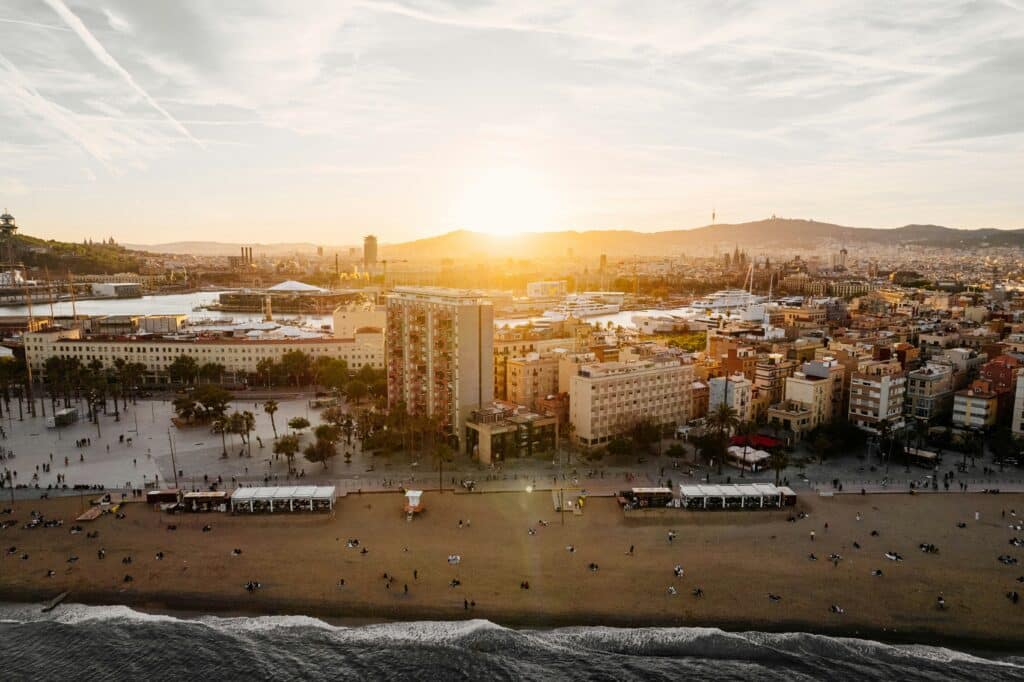Ready to move to the City of the Seven Hills? A coastal city on the Atlantic, Lisbon promises a life that is both relaxed and exciting. A haven for thousands of digital nomads, entrepreneurs and expat families, Portugal’s capital has much to offer both professionally and personally. From the perks to the cost of living, Foyer Global Health has some tips to help you navigate life in Lisbon.
Living in Lisbon: pros and cons
The advantages

The disadvantages
- The language barrier: although English is increasingly spoken, especially in the tourist areas, you’ll have to learn Portuguese if you want to fit in!
- Tourists! Lisbon is very popular with tourists, especially during the summer season.
- Finding a job in a local company is no easy task, especially if you don’t speak Portuguese!
- Slow and complex bureaucracy
Lisbon versus Porto
The Portuguese capital has many advantages over Portugal’s second city: a milder climate, more cultural attractions, a more vibrant social life, greater cosmopolitanism and more professional opportunities. Life in Porto, however, is less expensive than Lisbon featuring a slower-paced more traditional lifestyle.

Lisbon versus Barcelona
Both cities are sunny and boast a rich and diverse cultural and historical heritage. Lisbon offers a much more relaxed lifestyle than, for example, Barcelona and is more affordable.

Accommodation in Lisbon
The Portuguese capital’s huge popularity with tourists and expatriates alike has, in recent years, put pressure on the Lisbon rental market, leading to an increase in rental prices.
Searching for accommodation online is the most effective way to find it! You can visit websites that list property advertisements, such as Idealista. If you don’t speak Portuguese, it’s possible to get by in English, but it’s strongly recommended that you use an anglophone estate agent.
How much does it cost? Rental accommodation, often furnished, is very expensive, and, in recent years, rental prices have soared, making Lisbon’s rents some of the most expensive in Europe. For a one-bedroom flat in the city centre, you can expect to pay between €1,000 and €1,900 a month! You should also expect to pay a security deposit (around one month’s rent) plus between one and two months’ rent in advance, as well as monthly utilities (electricity, gas, internet), which are generally not included in the rent.
Please note that in order to rent a property in Lisbon and sign your contrato de arrendamento, you need a Portuguese tax identification number (numero de contribuinte). You can obtain this from your local tax office.
Want to buy property in Lisbon?
If you’re planning to stay in Lisbon for a long time, it’s worth buying your own home. The average price of a square metre in the city centre is now over €6,000. To make the process easier, use the services of a Portuguese estate agent.
What are the best areas to live in Lisbon as an expat?
Alone or with your better half, opt for Baixa, a charming and lively district located at the heart of Lisbon; or Chiado, if you fancy a chic and artistic surround, or for Alfama, Lisbon’s oldest district, for an authentic Lisbon experience. Parque das Nações offers modern accommodation and easy access to all amenities.
If you’re coming with your family, Lapa, Campo de Ourique or Alvalade, offer quiet but lively residential areas; great family places to live. Some of you may prefer to get away from the hustle and bustle of city life and settle in the seaside town of Cascais, or a little further afield to Torres Vedras.
Daily life in Lisbon
Budget and cost of living
While prices in Portugal are generally lower than in other European countries such as France, this is not necessarily true of the Portuguese capital, which is the most expensive in the country. The cost of living in Lisbon has risen sharply in recent years, because of the city’s popularity with expatriates and tourists.
While food is still very affordable, this is not the case for housing, related charges and telecommunications (internet and telephone subscriptions in particular). Housing comprises the largest debit in a Lisboners’ monthly budget, accounting for around 40% of total expenditure. A three-bedroom flat in the city centre costs between €2,000 and €4,000 a month, plus monthly utilities (around €130 for water and electricity) and a €38 internet subscription.
Expats wishing to send their children to an international school will have to budget school fees which are, on average, around €14,000 a year. Another factor to bear in mind is the price of fuel, which is more expensive than in other European countries.
Getting around Lisbon
If you live and work in Lisbon, the most practical way to get around is by public transport, which is very modern and covers all areas of the city and the suburbs. You can get the Viva Viagem card (or 7 Colinas Card), a rechargeable magnetic card that allows you to travel by bus, tram, metro or… lift!
While Lisbon’s four metro lines cover much of the capital and are very user-friendly, the tram is a picturesque way to get around and the city’s 600+ bus routes are very handy for getting from one part of Lisbon to another and to the suburbs. For more information on how to get around the city by public transport, please visit Carris!
Other modes of transport include the ferry, which crosses the Tagus and takes you to neighbouring cities, and the …. lifts, a very useful means of transport in the City of Seven Hills! Lisbon taxis are also a very cheap way to get around the city.
Electric scooters and cars are also popular with locals, but beware of the traffic at rush hour!
Working in Lisbon
Lisbon is the country’s economic powerhouse, and you are likely to find more job opportunities here than anywhere else in Portugal. In Lisbon, the main industries recruiting are services, tourism, technology and the public sector. Lisbon, the cradle of start-ups, is nicknamed Europe’s Silicon Valley! You can find a job in the many international companies that have set up in the Portuguese capital or, if you speak Portuguese or another sought-after language, in local companies.
Lisbon has also become a haven for young entrepreneurs from all over the world. In fact, many expats relocate to Lisbon as freelance workers with a digital nomad visa, which entitles them to generous tax benefits and Portuguese citizenship after five years in the country.
Family life in Lisbon
Childcare: nurseries, kindergartens or nannies
You can enroll your children aged between three months and three years in a nursery (berçário) and then place them in a kindergarten (jardim de infância) until they are six years old. These public services are available to expatriates as long as they are registered as residents in the country and hold a valid permit. You can also use crèches, private kindergartens or nannies (babá or ama) registered with the local authorities.
Schools in Lisbon
Expatriates can choose to send their children to Portuguese state schools (enrolment depends on the area of residence (Agrupamento), local secular or religious schools and international schools.
While some Portuguese private schools offer bilingual and international programmes, many expatriate families choose international schools that offer a curriculum in their own language or an international school programme such as the IB (International Baccalaureate). St Julian’s School (British curriculum); Carlucci American International School of Lisbon (CAISL – American curriculum and IB programme) and Lycée français Charles Lepierre are among the most popular schools among expat families.
Useful links
Practical advice from the Portuguese government
For lots of ideas for family activities: https: //pumpkin.pt/
Healthcare in Lisbon
Residents of Lisbon, including expatriates, can be affiliated to the SNS, the Portuguese health system, which covers treatment provided in Lisbon’s public facilities, health centres, permanent care services – SAP, or public hospitals. For greater flexibility and efficiency, however, many expatriates use private hospitals and clinics, a parallel system to the SNS, which requires international health insurance in order to be covered in all circumstances in Lisbon and anywhere in the world!
